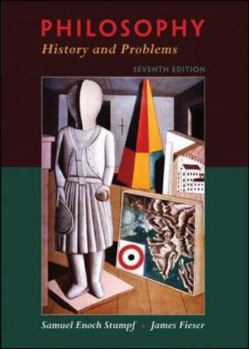Philosophy: History and Problems
Select Format
Select Condition 
Book Overview
This text brings together Stumpf's SOCRATES TO SARTRE, Fifth Edition (1993) and PHILOSOPHICAL PROBLEMS, Fourth Edition (1994) in one hardcover volume. It offers an accessible, single author survey of... This description may be from another edition of this product.
Format:Paperback
Language:English
ISBN:0072987820
ISBN13:9780072987829
Release Date:August 2007
Publisher:McGraw-Hill Humanities/Social Sciences/Languages
Length:960 Pages
Weight:2.70 lbs.
Dimensions:9.1" x 1.4" x 6.5"
Customer Reviews
2 ratings
Philosophy History and Problems
Published by Thriftbooks.com User , 16 years ago
For someone who loves history, this book of philosophy is presented in historical form. Mentions Socrates, Plato, Aristotle. Moves onto the Medieval period and St. Augustive's Christian Philosophy. Other subjects cover Karl Marx, ethics, religion, political philosophy, and theory of knowledge and metaphysics. Provides many, many examples of philosophical beliefs. Good book to use as research for a student of philosophy or anyone seeking to improve their knowledge and understanding of human nature. Contains 353 pages.
The Examined Life starts here...
Published by Thriftbooks.com User , 21 years ago
This philosophy book by Stumpf and Fieser is used at Ivy Tech State College as the primary text for the introduction to philosophy courses (100 level). It is a good survey of all the major topics in philosophy (from a classical Western standpoint), and includes many of the major thinkers over time, both in the narrative discussion presented by the authors, as well as in primary source readings from major philosophers themselves. As the book's self-description states, this is a combination of two previous texts - 'Socrates to Sartre and Beyond: A History of Philosphy' by Stumpf, and 'Philosophical Problems' by Fieser. These books are presented one after the other, both under one cover. The readings selected and edited by Fieser are grouped topically, generally following an early-to-late chronology of ordering. Thus, with judicious planning, the reader of philosophy can develop from both segments a good general survey from the earliest times (the timeline on the backplate begins with Thales, from 624-546 B.C.) to the present (again from the timeline, current thinkers listed include John Rawls, John Hick, and Carol Gilligan). The Stumpf text is divided into five major sections: I - Ancient Greek Philosophy; II - Hellenistic and Medieval Philosophy; III - Early Modern Philosophy; IV - Late Modern and 19th Century Philosophy; and V - 20th Century and Contemporary Philosophy. Section I looks at the major ancient Greek thinkers, such as Socrates, Plato and Aristotle, as well as lesser-known important figures and schools such as Thales, Pythagoras, the Sophists, and more. This is the time that philosophy began to be broken into certain topical areas (ethics, politics, metaphysics, logic, etc.) but also a time when the disciplines of science, mathematics and what we would call social sciences and arts and humanities were all directly and explicitly tied to the overall philosophical enterprise. The section on Hellenistic and Medieval Philosophy looks at later Greek schools (Stocism, Skepticism, Epicureanism) as well as the advent of Christianity and Christian influence in philosophical development. Key figures here include Augustine (heavily influenced by the twin sources of Christianity and Neoplatonism), Boethius, Anselm, Aquinas (influenced greatly by the European rediscovery of Aristotle), and late medieval figures such as Scotus, Ockham and Eckhart. Early Modern Philosophy begins at the time the various Renaissance and Reformation periods began, looking at key philosophers such as Machiavelli, Bacon, Hobbes, Descartes, Spinoza, Leibniz, and the British Empiricists; this was also the advent of the scientific revolution and prelude to the Enlightenment, so there were philosophies of politics, religion, science, knowledge and ethics significantly different from anything before. Late Modern and 19th Century Philosophy looks at primary Enlightenment figures such as Kant and Hegel, with fundamentally new ideas in the areas of metaphysic





